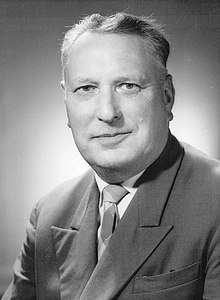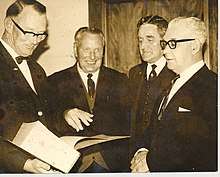John Gibbs Churchill
John Gibbs Churchill OBE JP (7 February 1905–2 December 1975) was a New Zealand trade unionist and local politician. For six years he was the mayor of Otaki.
Jack Churchill OBE JP | |
|---|---|
 Churchill c. 1960 | |
| 7th Mayor of Otaki | |
| In office 1969–1975 | |
| Preceded by | Otho Henry Edward Yates |
| Succeeded by | Murray Scott |
| Personal details | |
| Born | 7 February 1905 Wellington, New Zealand |
| Died | 2 December 1975 (aged 70) Ōtaki, New Zealand |
| Political party | Labour |
| Spouse(s) | Hilda Kate Barley ( m. 1929) |
| Profession | Mechanician |
Biography
Early life and career
Churchill was born 7 February 1905 in Wellington. He was educated at Terrace School and then Wellington College. In 1929 he married Hilda Kate Barley. That same year he entered employment with the New Zealand Post Office as a Mechanician. He rose to become a Senior Mechanician and then a Departmental Welfare Officer.[1]
He was a leading figure in the New Zealand Post Office and Telegraph Association. In 1937 he was elected on to the executive of the association and two years later was elected as Vice-President. He then served as its President from 1943 to 1946 when he resigned to take up a position on the association's permanent staff as associate secretary. He later became General Secretary of the association from 1958 to 1964 when he retired.[1]
Political career

In 1950 Churchill won a seat on the Wellington City Council on a Labour ticket which he was to hold until 1964 when he decided not stand for re-election.[2] He had twice stood for the council previously but been unsuccessful. He became leader of the Labour members on the council and was twice nominated for the position of deputy mayor. He lost in a ballot among fellow councillors to Harry Nankervis after the 1959 elections and again in 1962 to Denis McGrath (both from the Citizens' Association which held majorities on the council). He suffered a heart attack in 1963, which contributed to his decision to retire from the city council.[3] The council decided against holding a by-election to fill the vacancy caused by his retirement and his vacated seat remained empty until the 1965 elections.[4]
He stood for the Wellington Harbour Board unsuccessfully in 1956, polling higher than any other unsuccessful candidate. When a vacancy occurred on the board following the death of Sir Will Appleton, Churchill was expected to be awarded the vacated seat. However, he was defeated in a ballot of councillors eight votes to seven in favour of Nesbit Douglas Binnie (former general manager of Port Line) despite Binnie not having contested the previous election. Later an allegation surfaced that Citizens' Association members had met privately the morning before and had been influenced on nominating Binnie over Churchill.[5] Churchill was later elected to the Harbour Board in 1962, remaining a member until 1971 when he was defeated. Despite leaving Wellington, he was elected to serve on the board in his final three terms as a representative for Wellington, the first person outside the city to represent it on that body.[1]
He and his wife moved to Ōtaki in 1965 and in 1967 he was elected to the Otaki Borough Council in a by-election. In 1969 he stood for the mayoralty unopposed. He was similarly re-elected in the next two elections unopposed. He served as Mayor of Ōtaki until his death in 1975.[6]
Later life and death
In the 1965 Queen's Birthday Honours, Churchill was appointed an Officer of the Order of the British Empire, in recognition of his service as general sectreary of the Post Office Association.[7] In May 1974, he was appointed to the board of the Wellington Savings Bank by the Third Labour Government.
Churchill died at his home in Ōtaki on 2 December 1975 aged 70. He was survived by his wife, son and five grandchildren.[1]
Honorific eponym
Churchill Park, located in Seatoun, was named after him in recognition of his many years as chairman of the Wellington City Council Reserves Committee.[8] The now demolished Churchill Park in Ōtaki was likewise named after Churchill.[9]
Notes
| Wikimedia Commons has media related to John Gibbs Churchill. |
- "Mr J G Churchill P And T And Civic Veteran". Evening Post. 3 December 1975. p. 10.
- Betts 1970, pp. 259.
- "Cr. Churchill to Retire After 14 Years in Office". The Dominion. 16 October 1964.
- "Cr. Churchill Farewelled, Praise for Work on City Council". Evening Post. 10 December 1964.
- "Defeated Candidate Claims Party Machine Gave The Order". Evening Post. 4 November 1958.
- Meyer 1991, pp. 27-31.
- "No. 43669". The London Gazette (3rd supplement). 12 June 1965. p. 5514.
- "The history of Worser Bay". Stuff.co.nz. 27 June 2014. Retrieved 16 July 2018.
- Meyer 1991, pp. 31.
References
- Betts, G.M. (1970). Betts on Wellington: A City and its Politics. Wellington: A. H. & A. W. Reed Ltd. ISBN 0 589 00469 7.CS1 maint: ref=harv (link)
- Meyer, Daphne (1991). The Mayors of Otaki. Otaki Historical Society. p. 27-31.
| Political offices | ||
|---|---|---|
| Preceded by Otho Henry Edward Yates |
Mayor of Otaki 1969–1975 |
Succeeded by Murray Scott |